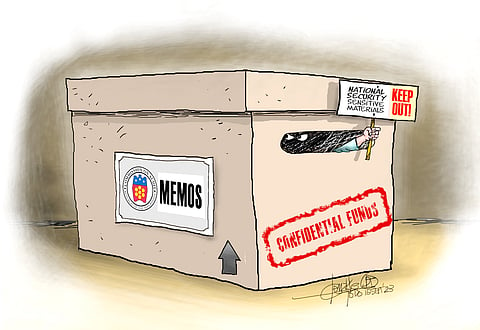
- NEWS
- the EDIT
- COMMENTARY
- BUSINESS
- LIFE
- SHOW
- ACTION
- GLOBAL GOALS
- SNAPS
- DYARYO TIRADA
- MORE

Transparency and accountability are fundamental principles in any democratic society. These principles ensure that the government and its agencies operate efficiently, fairly, and without corruption.
In pursuing these ideals, the Office of the Ombudsman plays a crucial role. However, recent controversy surrounds the Ombudsman's decision to hide Commission on Audit or CoA memos on using confidential funds.
Critics argue that this decision undermines transparency and fuels corruption, while others maintain that it is a necessary step to protect sensitive information.
The Ombudsman is an independent government agency responsible for investigating and addressing complaints against government officials and agencies. It is a key institution in upholding transparency and accountability in the public sector. One of its primary functions is to ensure that government resources are used efficiently and ethically. In this context, CoA memos play a critical role.
CoA is the government agency responsible for auditing government funds and ensuring they are used by laws and regulations. CoA memos contain crucial information about audit findings, including irregularities and deficiencies in the use of public funds.
Among the various types of funds audited by CoA, confidential funds are of particular interest. These funds are allocated to government agencies for sensitive and classified operations, such as intelligence gathering and national security.
The controversy arose from the Ombudsman's decision to hide CoA memos related to the use of confidential funds. The Ombudsman has argued that releasing such memos could compromise national security and expose sensitive operational details. Therefore, the decision is framed as a measure to protect the country's interest.
While the Ombudsman's intention to protect national security is commendable, hiding CoA memos raises several concerns.
Transparency is a cornerstone of accountability. Withholding information from the public can create a perception of secrecy and a lack of accountability among government agencies. This may erode public trust.
The decision may provide a convenient cover for corruption and misuse of funds under the guise of national security. Without oversight, there is a risk that some officials may exploit confidential funds for personal gain.
CoA's audits are crucial in unearthing financial irregularities and ensuring that public funds are used efficiently. Hiding CoA memos may discourage auditors from performing their duties effectively, as their findings may remain hidden.
The decision sets a concerning legal precedent. If government agencies can withhold information on the grounds of national security without sufficient oversight, it could potentially be abused in the future.
Militant groups and other critics argue that transparency should not be compromised, even in the name of national security. Their concerns include:
Transparency acts as a check on government power. Without it, there is a risk that government agencies could overreach or abuse their authority.
Instead of hiding CoA memos entirely, critics suggest that a compromise could be reached. Redacting sensitive information while still providing an overview of the audit findings may strike a balance between national security and transparency.
Maintaining transparency can actually strengthen accountability by allowing the public and civil society organizations to hold government agencies accountable for their actions.
Trust in government is essential for a functioning democracy. Transparency fosters trust, while secrecy can breed suspicion and mistrust.
The Ombudsman's decision to hide CoA memos on the use of confidential funds is a contentious issue that raises questions about transparency, accountability, and the balance between national security and public oversight.
While the intention to safeguard national security is valid, it must be weighed against the potential risks of corruption and the erosion of public trust. Finding a middle ground that allows for transparency while protecting sensitive information may be the key to addressing these concerns.
Ultimately, the decision's impact on corruption and transparency will depend on how it is implemented, monitored, and evaluated in practice.
Balancing these interests is a complex task, and debate and scrutiny are essential in ensuring that the principles of democracy are upheld.
